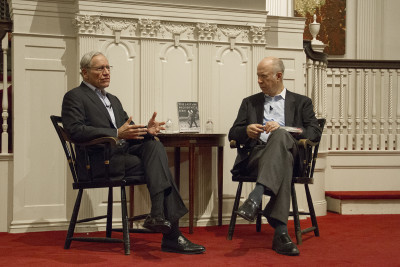
Bob Woodward, the Pulitzer Prize-winning investigative journalist who broke the Watergate scandal with colleague Carl Bernstein for The Washington Post in 1972, visited Cambridge Tuesday to promote his latest book, “The Last of the President’s Men.”
“What you’re always looking for is the part of the story you don’t have,” Woodward said to a crowd of 300 that gathered at First Parish for the event, hosted by Harvard Book Store and the Nieman Foundation.
During the conversation, Woodward, joined by CNN senior political analyst and Harvard University professor David Gergen, spoke of his journalistic experience breaking the scandal and brought the discussion of Watergate to the present day, emphasizing the need for transparency within the executive branch.
“You can’t love history without knowing Woodward,” said Jamie Ames, 59, of Watertown. “I go back to ‘All the President’s Men,’ that’s what started it all. It’s fascinating to pull back the veil.”
“The Last of the President’s Men” provides information about the secret White House taping system that eventually led to former President Richard Nixon’s resignation. The book is a product of lengthy interviews Woodward conducted with Alexander Butterfield, a former Nixon aide who first revealed the system.
Woodward said one of his main curiosities while reporting regarded the president’s power and the role a journalist plays in providing related information to the public.
“Is the allure of power so great that you and all these people are moths drawn to the flame?” he said. “It drives you to the question of, ‘Who are these people who become president?’ We need to know not less about them. We need to know more.”
When Gergen, who worked as a speechwriter for Nixon in the ’70s, asked about the drama surrounding the tape recordings, Woodward said Butterfield’s knowledge was imperative in revealing the secretive information.
“In the business of journalism, you’re interested in two things — what happened and what makes people do things,” Woodward said. “It’s a psychodrama.”
When Woodward was finally able to track down Butterfield at his home in La Jolla, California, he found 20 boxes of Nixon-era documents in his attic.
“It is a new, untold level of Nixon that, quite frankly, after all the tapes and everything, shocked me,” Woodward said. “ … The tapes are the ultimate front row seat, but for two years, there was no taping system. In a sense, Butterfield became the tape recorder.”
The audience, made up of primarily middle-aged attendees intermixed with some millennials, listened attentively and erupted in laughter after Woodward’s clever remarks to Gergen about the latter’s former boss.
“Did you ever try to slip him [Nixon] a Valium?” Woodward said.
Joking aside, Woodward spoke of what he deemed to be Nixon’s mismanagement of the Vietnam War, as well as Nixon’s focus on reelection rather than the conflict.
“There are not enough psychiatrists in the world to really figure out what happened here,” Woodward said. “…What does he [Nixon] do that year he’s running for reelection? He bombs more.”
Woodward also applied this criticism to current politics, and said that presidents should listen to their constituents’ concerns prior to making major decisions.
“I think how you go about your job, the process, is really important,” he said. “ … You have to look at how somebody makes decisions. What’s the process? The characteristic that is most missing from presidents is probably listening. Nixon was not a listener.”
Justin Berke, 44, of Framingham, said he agreed with Woodward’s concepts in theory, but was unsure of how well political transparency would work in the real world.
“[Transparency] is sort of a double-edged sword,” Berke said. “I think because people need to be so transparent and there’s so much out there about them, there [are] a lot of good people that will never run that might be more qualified than others.”
Government transparency was also a theme in Woodward’s response to an attendee who asked about the journalist’s current political concerns.
“What we should worry about the most is secret government,” Woodward said. “That’s what does this country in if anything. Democracies die in darkness.”
Editor-in-Chief. Bostonian by way of Indiana. Excessive Instagrammer. Seltzer addict. Journalism junkie, storytelling fiend.














